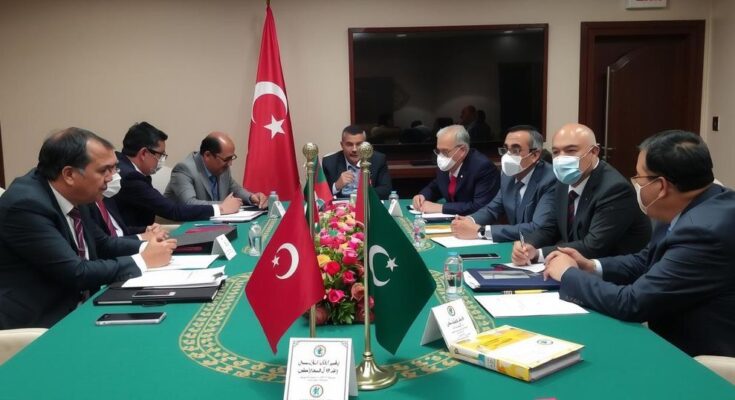Representatives from Libya’s Parliament and the High Council of State met in Morocco to facilitate elections aimed at resolving Libya’s dual governance. Morocco has previously hosted talks to unify these factions, while the UN announced a technical committee to aid in establishing a consensus-based government. These discussions are part of ongoing efforts to stabilize the country after years of conflict since Gaddafi’s ousting in 2011.
On Wednesday in Bouznika, Morocco, a consultative meeting occurred between representatives from Libya’s Parliament and the High Council of State, who operate in Tripoli. The Moroccan Foreign Minister, Nasser Bourita, stated the objective of this meeting is to facilitate elections that would resolve the dual governance structures presently hindering Libya’s political stability. He emphasized the urgent need for international cooperation to support the formation of a national unity government while underscoring that any resolution must originate from within Libya itself.
Morocco has played a pivotal role in the dialogue process, hosting six rounds of negotiations, including one in January 2021 that outlined criteria for appointing key positions within Libya’s governance. Recently, the United Nations Support Mission in Libya announced the establishment of a technical committee consisting of Libyan experts tasked with determining essential priorities for a consensus-driven government. These initiatives are integral to the broader endeavor of reinstating elections that could put an end to the ongoing power struggle in Libya, a country that has faced turmoil since the overthrow of Muammar Gaddafi in 2011.
Post-Gaddafi, Libya has been bifurcated into two main governing factions: the Tripoli-based Government of National Accord, which receives international recognition, and the command of Khalifa Haftar in Benghazi. Efforts such as the recent meeting in Morocco aim to unify these factions and establish a framework conducive to political elections, which are critical for the restoration of stability and governance in Libya.
Libya has been embroiled in conflict since the ousting of its long-time leader, Muammar Gaddafi, in 2011. The power vacuum created by his removal led to a fragmented political landscape, with competing governments and military factions vying for control. The internationally recognized Government of National Accord operates from Tripoli, while rival forces led by Khalifa Haftar dominate parts of the eastern region. This prolonged instability has hindered the establishment of a cohesive national government, prompting various international mediation efforts, including those spearheaded by Morocco. The recent consultative meeting is part of these broader diplomatic initiatives aimed at achieving a unified political framework and ultimately enabling elections to restore order in Libya.
The meeting between Libyan representatives in Morocco signifies a critical step toward resolving the protracted political impasse in Libya. With the support of international stakeholders and the establishment of a technical committee by the United Nations, there is hope for laying the groundwork for future elections. These efforts underscore the importance of internal resolution for Libya’s governance challenges, striving to unify the conflicting factions and facilitate a return to political normalcy in a country long divided by strife.
Original Source: www.aa.com.tr




